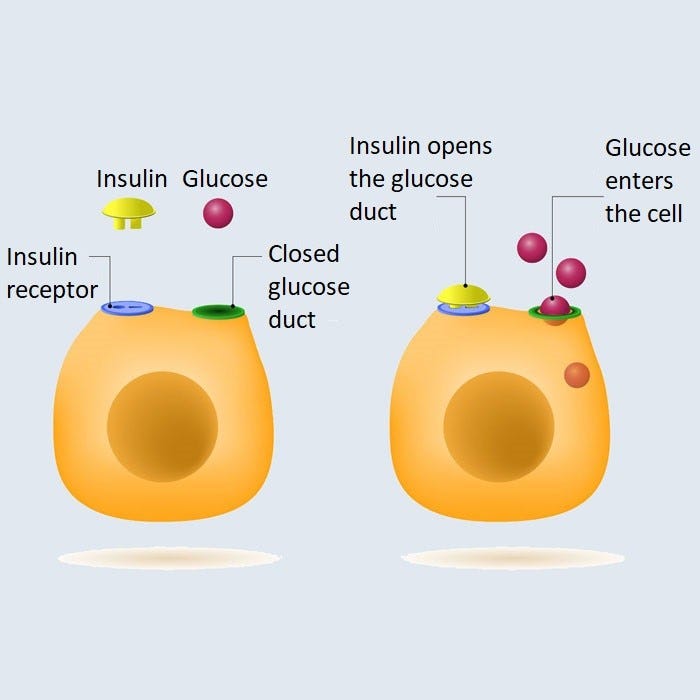Obesity, Non-Alcoholic Fatty Liver, PCOS, Heart diseases, and even some recurring cancers might have one common link which is "Insulin Resistance".
Insulin Resistance or hyperinsulinemia (meaning too much Insulin in the Blood) is problematic. "Insulin" was once thought of as a humble hormone is now the root cause of many chronic conditions today.
It's important to understand Insulin resistance. You may even want to get it checked. I have got mine checked and I am Insulin resistant.
To understand Insulin Resistance, we first need to understand what Insulin does to our bodies. Our body’s muscle cells need glucose to function well. But they cannot take glucose in without Insulin's help. The main job of the Insulin hormone is to help Glucose enter our muscle cells. Insulin is like a door opener for glucose.
Insulin resistance occurs when the body cells become less sensitive to each Insulin hormone. Muscle cells become resistant to Insulin meaning they do not allow every Insulin hormone to open their doors and let glucose enter inside them.
So, why Insulin Resistance is bad for us?
When we eat food, our stomach absorbs glucose from it, this glucose starts circulating in the blood, the brain senses an increased amount of glucose and signals the pancreas to release Insulin in the bloodstream which then “opens the doors” of muscle cells to escort glucose from the blood to them.
If our body's muscle cells are Insulin resistant, that means blood glucose won’t come down to the normal level, because muscle cells cannot take glucose in with existing Insulin. Our brain will sense this high glucose and will signal the pancreas to release more Insulin. Suppose for a healthy body, x amount of Insulin is required to bring down glucose level. For Insulin resistant body, it will be 10x the amount of Insulin (just a random number to explain) to get the job done. In this 10x Insulin, 1x Insulin will help glucose enter the muscle cells and overall glucose level will come down to healthy levels. But what about the extra 9x Insulin that’s now circulating in the blood?
This extra Insulin keeps interacting with other parts of the body including Ovaries cells, Liver cells, Arteries cells, and fat cells which are never meant to interact in the first place. And that’s a problem.
One can have Insulin resistance for years before being diagnosed as diabetic type-2 because the pancreas will keep on releasing more Insulin to maintain glucose levels and that’s why our blood glucose reports don’t reveal Insulin resistance. Many will never become diabetic but will develop other chronic diseases if their pancreas is much stronger.
According to a recent study, almost 85% of Americans may be Insulin resistant and 50% of Indian Adults are Insulin resistant by now.
So, how do you check if you have Insulin Resistance?
Have more fat around your belly?
Have high blood pressure or blood triglycerides?
Have a family history of heart disease, Insulin resistance, or type 2 diabetes?
Have patches of darker-color skin or little bumps of skin (“skin tags”) at your neck, armpits, or other areas?
Have polycystic ovarian syndrome (PCOS; for women) or erectile dysfunction (for men)?
All of the above questions reveal some connection to Insulin resistance. If you answered “yes” to any one question or more, getting checked for Insulin resistance is not a bad idea.
Insulin-fasting, Insulin - PP, and Homa-IR are blood tests that can check for Insulin resistance.



Thanks for this wonderful write up, it is very well written and very easy to understand.
I have a follow up question - Are the 3 blood tests mentioned above a sure shot way of determining if we have Insulin resistance or not? Out of the 5 questions mentioned above, I answered yes to only the PCOS question - no doctor has been able to fix this condition, nor being able to diagnose the root cause (I have been told that the root cause of PCOS cannot be determined). The only 2 symptoms of PCOS that I have are acne and facial hair, and I have lean PCOS.
Wondering if insulin resistance is identifiable through a test, is it reversible too? No doctor has ever suggested these tests though..